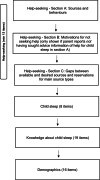UK parents' help-seeking for child sleep: A qualitative investigation into parental preferences and reservations about resources
- PMID: 35942805
- PMCID: PMC10087529
- DOI: 10.1111/hsc.13959
UK parents' help-seeking for child sleep: A qualitative investigation into parental preferences and reservations about resources
Abstract
Child sleep is a common parental concern and there is an array of resources available to parents. However, an exploration of UK parents' help-seeking behaviours around child sleep is lacking. This study sought to identify the resources parents use to seek information and help for child sleep, as well as to explore what factors parents prefer about certain sources and their reservations about using other resources. Parents of 6-36 month old children residing in the United Kingdom (UK) completed an online questionnaire between October 2015 and October 2016 about their use, opinions and experiences regarding resources for child sleep. Quantitative data were descriptively analysed and thematic analysis was conducted on parents' open-ended text responses. Participants were 266 UK parents (97% mothers). Parents' ages ranged from 21 to 45 years (M = 33.49 years, SD = 4.71) and all resided in the United Kingdom (UK). General Internet searches were the most commonly reported source used by 47% of parents with a range of other informal resources also frequently consulted. Health Visitors (HVs) were the most accessed healthcare professional reportedly consulted by 38% of parents. Seven themes represented parental preferences for their resource use. Most strongly endorsed included a desire for information from other parents, particularly those with practical experience and accessing information that aligned with their parenting values. Parents preferred sources that provided support and reassurance, as well as those that afforded parents the ability to select relevant elements from a range of information. Seven themes represented parents' reservations about resources. Most strongly endorsed were concerns about reliability, being judged and challenges associated with filtering vast amounts of information. Parents reported having reservations towards sources if they had a previous negative experience with the source. Possible implications of the findings and specific suggestions about how existing and future resources could be adapted to better meet parents' needs are highlighted.
Keywords: child sleep; help-seeking; preferences; reservations; resources.
© 2022 The Authors. Health and Social Care in the Community published by John Wiley & Sons Ltd.
Conflict of interest statement
The authors declare no commercial or financial conflicts of interest.
Figures


Similar articles
-
Parental professional help-seeking for infant sleep.J Clin Nurs. 2017 Dec;26(23-24):5143-5150. doi: 10.1111/jocn.14061. Epub 2017 Oct 9. J Clin Nurs. 2017. PMID: 28881073
-
Parents' information needs, self-efficacy and influences on consulting for childhood respiratory tract infections: a qualitative study.BMC Fam Pract. 2013 Jul 28;14:106. doi: 10.1186/1471-2296-14-106. BMC Fam Pract. 2013. PMID: 23890343 Free PMC article.
-
Understanding parental concerns related to their child's development and factors influencing their decisions to seek help from health care professionals: Results of a qualitative study.Child Care Health Dev. 2020 Jan;46(1):9-18. doi: 10.1111/cch.12731. Epub 2019 Dec 27. Child Care Health Dev. 2020. PMID: 31797396
-
Immigrant parents' experiences of accessing child healthcare services in a host country: A qualitative thematic synthesis.J Adv Nurs. 2020 Jul;76(7):1509-1519. doi: 10.1111/jan.14358. Epub 2020 Apr 30. J Adv Nurs. 2020. PMID: 32189345 Review.
-
Parents and carers' experiences of seeking health information and support online for long-term physical childhood conditions: a systematic review and thematic synthesis of qualitative research.BMJ Open. 2020 Dec 28;10(12):e042139. doi: 10.1136/bmjopen-2020-042139. BMJ Open. 2020. PMID: 33372077 Free PMC article.
References
-
- Allen, K. , & Rainie, L. (2002). Parents online. Pew internet and American life project. Retrieved from: http://www.pewinternet.org/~/media/Files/Reports/2002/PIP_Parents_Report...
Publication types
MeSH terms
LinkOut - more resources
Full Text Sources

